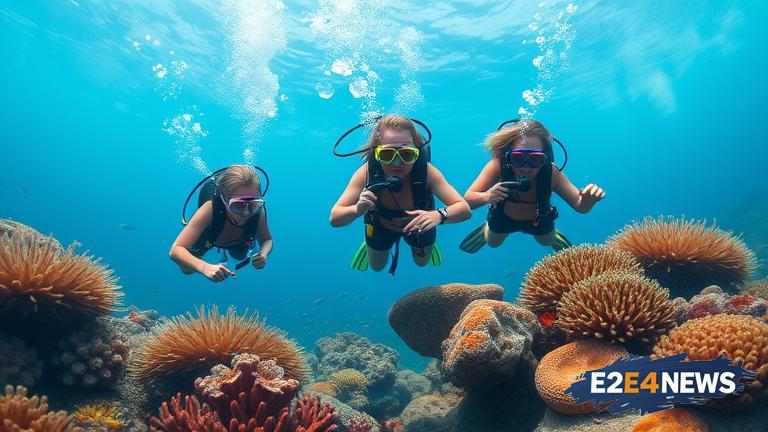A group of middle school students recently had the opportunity to become marine biologists for a week, immersing themselves in the world of reef conservation. The program, which took place at Kimberly’s Reef, aimed to educate and inspire the next generation of marine biologists and conservationists. The students spent their days learning about the importance of coral reefs, the impact of human activities on these ecosystems, and the ways in which they can contribute to their preservation. Through a combination of classroom instruction and hands-on activities, the students gained a deeper understanding of the complex relationships between the plants and animals that call the reef home. They also had the chance to participate in snorkeling and diving excursions, getting up close and personal with the marine life that inhabits the reef. The program’s instructors, all experienced marine biologists, provided guidance and support throughout the week, helping the students to develop their skills and knowledge. The students learned about the different types of coral, the role of sea grass in the ecosystem, and the impact of climate change on the reef. They also had the opportunity to participate in citizen science projects, collecting data and contributing to ongoing research efforts. The program’s focus on hands-on learning and real-world applications helped to make the experience engaging and memorable for the students. By the end of the week, the students had gained a newfound appreciation for the importance of marine conservation and a deeper understanding of the ways in which they can make a positive impact. The program’s organizers hope that the experience will inspire the students to pursue careers in marine biology and conservation, and to become leaders in the effort to protect and preserve the world’s coral reefs. The students’ experiences were documented through a series of blog posts and social media updates, providing a unique glimpse into the world of marine biology and conservation. The program’s success has sparked interest in expanding the initiative to other locations, providing more students with the opportunity to become involved in marine conservation efforts. The importance of educating the next generation of marine biologists and conservationists cannot be overstated, as the health of the world’s coral reefs depends on their efforts. Coral reefs provide habitat for a vast array of marine life, protect coastlines from erosion, and support commercial fisheries. However, these ecosystems are facing numerous threats, including climate change, pollution, and overfishing. The students’ experiences at Kimberly’s Reef provided a unique perspective on the importance of preserving these ecosystems, and the ways in which individuals can contribute to their conservation. The program’s emphasis on community involvement and outreach helped to raise awareness about the importance of marine conservation, and to inspire others to get involved. By working together, it is possible to make a positive impact on the health of the world’s coral reefs, and to ensure the long-term sustainability of these ecosystems. The students’ experiences at Kimberly’s Reef serve as a reminder of the importance of providing opportunities for young people to engage with the natural world, and to develop a deeper appreciation for the importance of conservation. The program’s organizers hope that the experience will have a lasting impact on the students, and that it will inspire them to become leaders in the effort to protect and preserve the world’s coral reefs. The program’s success demonstrates the value of hands-on learning and community involvement in promoting marine conservation, and provides a model for similar initiatives in other locations. The students’ experiences at Kimberly’s Reef provide a unique perspective on the importance of preserving coral reefs, and the ways in which individuals can contribute to their conservation. The program’s emphasis on education and outreach helps to raise awareness about the importance of marine conservation, and to inspire others to get involved. By working together, it is possible to make a positive impact on the health of the world’s coral reefs, and to ensure the long-term sustainability of these ecosystems.
